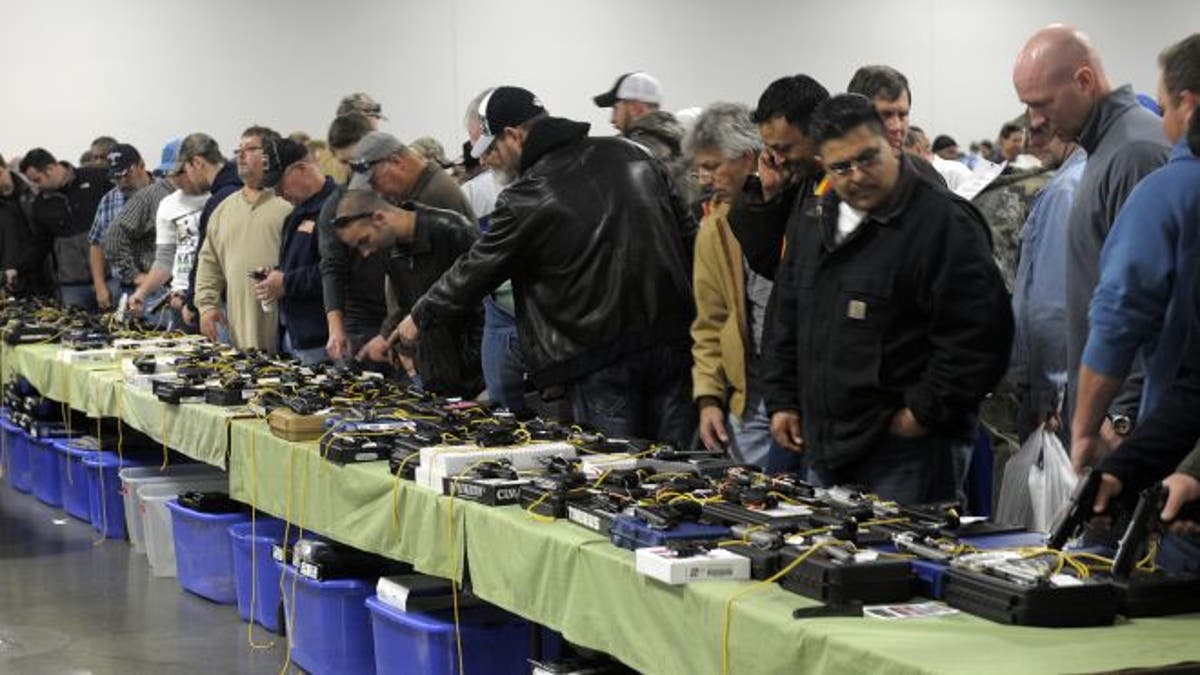
Dec. 22, 2012: People look over a table of handguns for sale at a gun show in Kansas City, Missouri. (Reuters)
JEFFERSON CITY – The Missouri State Highway Patrol acknowledged Thursday that it has twice provided a list of 163,000 Missouri residents with concealed gun permits to a federal investigator — an admission immediately seized upon by Republicans as grounds for further investigations, firings and potentially even criminal charges against state officials.
Testifying before a Senate committee, Highway Patrol Col. Ron Replogle said the concealed guns list was given to an investigator looking into potential fraud involving Social Security benefits for the disabled. But he said the investigator never was able to read the encrypted information and ultimately destroyed the computer discs.
Republicans expressed concern that the privacy rights of Missouri residents are being infringed, but members of Democratic Gov. Jay Nixon's administration insisted there was nothing wrong with the information sharing.
The fact that the information may never have been used by federal agents did little to pacify Republican lawmakers, who ratcheted up their opposition to a state database storing personal information about driver's license applicants, including whether they have concealed gun permits.
Republican House Speaker Tim Jones called upon Democratic Attorney General Chris Koster to appoint an independent investigatory panel. Republican members of the Senate Appropriations Committee suggested Nixon should fire officials involved in overseeing and sharing information from the driver's license database. And U.S. Rep. Blaine Luetkemeyer sent letters to various federal officials demanding answers about the information gathering.
"This is a big breach of public trust and confidence," said Sen. Dan Brown, R-Rolla, a member of the Senate Appropriations Committee, which has been holding hearings on the topic.
Republicans asserted that state officials had violated a Missouri law making it a misdemeanor to disclose information about concealed gun permit holders. But members of Nixon's administration insisted the information was appropriately shared among law enforcement agencies and could legally be done so again, though they added that any future requests for such data would undergo extra scrutiny.
"There's nothing in the law that prevents (a federal investigator) from getting that information in batch form," said Andrea Spillars, deputy director of the Department of Public Safety, which oversees the Highway Patrol.
But Senate Appropriations Committee Chairman Kurt Schaefer, R-Columbia, suggested the release of the full database didn't fall under an acceptable law enforcement function.
"I believe that it crosses the line between law enforcement activity to profiling through intelligence gathering," he said.
As recently as last week, Nixon had brushed aside questions about the emerging controversy involving driver's license information obtained by the Department of Revenue. He told reporters: "This state of Missouri is not collecting a bunch of unuseful data to send to some sort of magical database someplace to mess with people. It's not happening."
Republican Lt. Gov. Peter Kinder asserted Thursday that Nixon had "misled Missourians." But Replogle and Spillars said they had never told Nixon that the concealed guns list had been shared with a federal investigator and only learned of it themselves after the fact.
Missouri lawmakers first raised privacy concerns last month after learning that the Department of Revenue had in December begun making electronic copies of driver's license applicants' personal documents, such as concealed carry permits and birth certificates, to be kept in a state database. Licensing officials say the intent is to catch fraud. They note that a clerk at a St. Joseph office pleaded guilty in December in a scheme that used false personal documents to issue licenses to more than 3,500 people living in the U.S. illegally.
The documents being scanned under new state procedures were not provided to the federal government. Instead, the federal investigator received an electronic list of concealed carry permit holders that the Revenue Department compiled as part of its duties of placing concealed carry endorsements on driver's licenses.
Replogle said a St. Louis-based investigator in the inspector general's office of the U.S. Social Security Administration contacted the Highway Patrol in November 2011 seeking a list of Missouri's concealed gun permit holders for a probe into whether people were fraudulently claiming mental illnesses to get disability benefits. People with mental illnesses are not supposed to be issued concealed gun permits, so their inclusion on the state's list could indicate they either weren't mentally ill or shouldn't have a concealed gun, Replogle said.
He said the patrol obtained the concealed gun permit list and provided it on a disc, but the federal investigator was unable to read it and destroyed it. This January, the same investigator made the same request and the patrol again obtained and shared a computer disc containing information about 163,247 people with concealed gun permits. But Replogle said the federal investigator again was unable to read the data and again destroyed the disc.
Had he been consulted first, Replogle said he would have provided information only on specific people that the Social Security Administration was investigating, not the entire list.
The House on Thursday passed legislation intended to stop the Revenue Department from making electronic copies of concealed gun permit documents. The bill also would require the department to destroy those documents that already have been collected.




